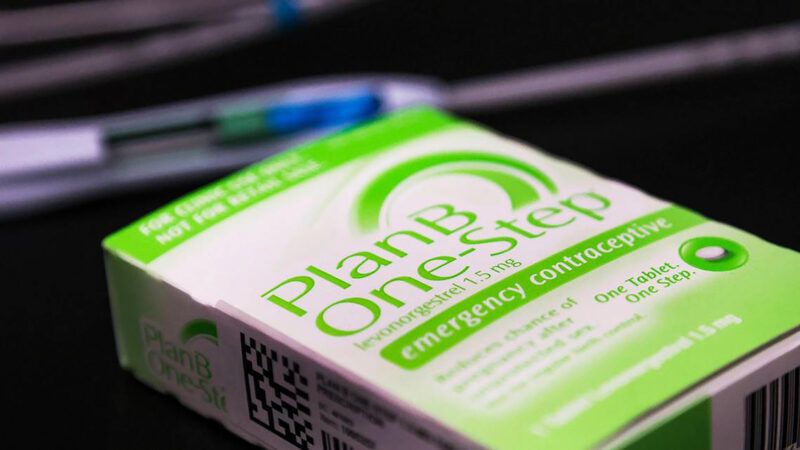Emergency Contraception Fills in Massachusetts Spiked After This Policy Change
Making emergency contraception easier to get leads to more people getting emergency contraception. Who would’ve guessed?
Elizabeth Nolan Brown | 8.14.2024 10:30 AM

Between August 2022 and October 2023, the number of people filling emergency contraception prescriptions in Massachusetts spiked. Was the state experiencing an epidemic of unprotected sex?
Probably not. Researchers attribute the increase to the state making it easier for pharmacists to dispense the emergency contraceptives ulipristal (sold under the brand name Ella) and levonorgestrel (sold as Plan B), thereby making it easier for women to walk into a pharmacy and quickly walk out with the medication.
Making emergency contraception easier to prescribe and easier to get leads to more people getting emergency contraception. Who would’ve guessed?
Removing Barriers to Access
“Emergency contraceptives are key in preventing pregnancy after unprotected sexual intercourse and contraceptive failure,” note Dima M. Qato, PharmD, Jenny Guadamuz, and Rebecca Myerson in a research letter published by the Journal of the American Medical Association (JAMA).
More than two dozen states now allow birth control pills—including emergency contraception—to be picked up at a pharmacy without first obtaining a doctor’s prescription. These medications are still technically prescription-only (as required by the U.S. Food and Drug Administration), but a pharmacist can write someone a prescription on the spot.
“However, these policies require pharmacists to undergo additional training and patients must complete a health questionnaire,” the researchers explain in their JAMA letter. “Given these barriers, many pharmacies do not implement pharmacist-prescribed contraception services.”
In an attempt to overcome pharmacy barriers, Massachusetts did something unusual: it deregulated. In August 2022, the state issued a statewide standing order allowing pharmacists to dispense the emergency contraceptives ulipristal and levonorgestrel without doing any extra training. Pharmacists could prescribe the medications to someone after asking just a few basic questions.
“The Massachusetts policy overcomes prescribing barriers by using the state as the prescriber,” note Qato and colleagues, all professors in some form of health education (Qato at the University of Southern California’s School of Pharmacy and Pharmaceutical Services, Guadamuz at the University of California, Berkeley School of Public Health, and Myerson in the University of Wisconsin Madison’s Department of Population Health Sciences). Their study “evaluated the association between Massachusetts’ statewide standing order and emergency contraceptive fills at retail pharmacies.”
They found that emergency contraception fills went up after the standing order was implemented—from 78.5 per 100,000 women of reproductive age in Massachusetts to 105.3 fills per 100,000 women.
Same Spike Not Seen in Other States
The increase in emergency contraception fills was associated with a spike in prescription-only ulipristal fills and no significant change for prescribed levonorgestrel, which is also available without a prescription. The authors note that ulipristal is effective for up to five days after unprotected sex, compared to three days for levonorgestrel, and is considered more effective in overweight and obese women.
OK, you might be thinking—but this was right after the Dobbs decision, which overturned Roe v. Wade. Couldn’t fear about what the decision would mean for birth control or abortion access have led to an increase in emergency contraception prescriptions? That’s indeed plausible.
But Qato and her colleagues didn’t simply find an increase in Massachusetts residents picking up prescription emergency contraception. They also found an increase that was 32 percent larger than in comparison states.
The comparison states they used were Illinois and Connecticut. “Illinois and Connecticut did not implement statewide standing orders but otherwise resembled Massachusetts in their abortion and contraceptive policies, including requiring insurance to cover prescribed emergency contraceptives without cost sharing,” note the researchers.
In Illinois and Connecticut combined, there were 45.8 emergency contraceptive fills per 100,000 women during the first period studied (July 2021 to May 2022) and 48.4 in the second period (August 2022 to October 2023). All in all, “the statewide standing order policy was associated with an additional 25.2 emergency contraceptive fills per 100,000 in Massachusetts vs comparison states,” the researchers found.
Their conclusion: “Policies that reduce prescribing barriers may improve access to emergency contraceptives.”
That takeaway may seem obvious, but it’s still nice to have some data to back up our common sense. The study provides one more piece of evidence to suggest that activists and politicians aiming to prevent unintended pregnancies and reduce abortion numbers should figure out ways to remove access barriers to emergency contraception.
Alas, we can’t really draw any conclusions about whether or how the Massachusetts policy change on emergency contraception affected abortion rates in the state, since the state concurrently saw an influx of out-of-state visitors seeking abortions. In general, evidence has been mixed on whether increasing access to emergency contraception brings down abortion rates.